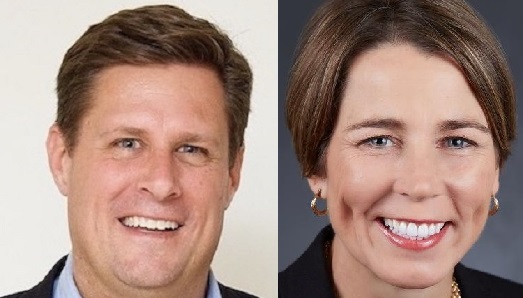latest
Poll puts Healey, Diehl ahead of pack and doubts surtax support

By Matt Murphy
FEB. 16, 2022…..With seven months before voters go to the polls, Attorney General Maura Healey and former Rep. Geoff Diehl hold significant advantages with voters in their parties, and Healey, a Democrat, is the clear front-runner to succeed Gov. Charlie Baker, though more than half the electorate has yet to choose a candidate, according to a new poll.
Healey led the field of Democrats and Republicans in the race for governor with 29.2 percent support, according to a new poll commissioned by the Massachusetts Fiscal Alliance, followed by Diehl, a former Republican state lawmaker, with 13.5 percent.
More than 52 percent of voters surveyed, however, said they did not know who they would vote for if the election were held today.
“It’s very clear to me at least that Diehl and Healey are the candidates people are paying attention to the most at this point,” said Paul Craney, of the Mass Fiscal Alliance Foundation.
The poll also attempted to gauge support for a question moving toward the ballot in November that would impose a surtax of 4 percent on all earned income above $1 million. The MassFiscal poll found that 51.6 percent of voters oppose the proposed ballot question, which is an outlier from other polls that have found significant support for the wealth tax.
The poll did not describe the income surtax in detail, but rather told respondents it would “raise the income tax on some high-income earners and middle-class small businesses.”
“I think that’s pretty damaging for the proponents of this ballot question,” Craney said.
The proposed ballot question would raise the income tax on earnings after the first $1 million from 5 percent to 9 percent, generating an estimated $1.3 billion annually in new revenue for the state that is supposed to be spent on education and transportation.
Many previous polls have found strong support for the concept advanced by Democratic lawmakers on Beacon Hill, and the proponents pushed back on the MassFiscal Alliance poll as a “smoke screen.”
“The facts are that the Fair Share Amendment has earned strong support in poll after poll after poll because Massachusetts voters understand that our children need new long-term investments in our schools. As families emerge from the pandemic, they travel on roads, bridges and rails that are increasingly in disrepair. Workers hoping for a new career are painfully learning that our public colleges are unaffordable for people just trying to get ahead,” said the Raise Up Coalition, a group that has been pushing for a tax on millionaires for many years.
A poll conducted by the MassINC Polling Group in December found 69 percent support for the surtax when voters were told that it would apply to income over $1 million and help fund transportation and education.
A similar poll conducted by UMass Amherst in March 2021 left out the description for voters of how the money would be spent, but found a similar level of support at 65 percent.
Advantage, Inc. pollster Jim Eltringham said the MassFiscal survey left out a detailed description of the tax to simplify the issue for voters, but chose to tell them it would generally impact high-income households, middle-class small businesses.
“Using the $1 million threshold, I do think there’s a fair amount of connotation when you start talking about it as a millionaires tax and you conjure images of top hats and monocles,” Eltringham said.
The Raise Up Coalition actually relied on polling when deciding on the $1 million threshold, which proved more popular than lower income ceilings.
Craney said that perhaps future polls conducted by his group will be “more direct.”
“Our struggle with these poll questions is to try to deliver something that is as easy to understand as possible and if you get too far down in the weeds it’s harder to connect with people,” Craney said.
Rather than poll the Democratic and Republican primaries with voters likely to participate in each of those September contests, the MassFiscal poll put all candidates in the same pool and asked voters to choose.
Healey polled the strongest among Democrats with 46 percent support compared to 1.9 percent for Sen. Sonia Chang-Diaz and 1.9 percent for Harvard professor Danielle Allen, who announced Tuesday she was dropping out of the race. Among Republicans, Diehl had 27.1 percent support to 12.3 percent for Healey, while the other Republican in the race, Wrentham businessman Chris Doughty, had just 2.5 percent support within his own party and 1.7 percent overall.
Unenrolled voters, who make up the largest voting bloc in Massachusetts and were critical to Baker’s success in the past two gubernatorial elections, also broke for Healey with 23 percent saying they would support the attorney general compared to 16.3 percent for Diehl. Chang-Diaz and Doughty both had 2.4 percent support among independents, and Allen registered just 1.1 percent support.
Overall, 52.4 percent of voters said they were undecided, including 46.7 percent of Democrats, 57.4 percent of Republicans and 54.7 percent of independents.
The poll was conducted by Virginia-based Advantage, Inc., whose website says it specializes in surveys for Republican candidates and referendum questions. The survey of 750 voters was conducted Feb. 8-10 and had a margin of error of 3.5 percent.
The largest percentage of voters, or 22.7 percent, identified jobs and the economy as the most important issue to them as they consider candidates for governor, followed by health care (11.7 percent), law enforcement and the rule of law (11.3 percent), climate change (10.5 percent) and taxes (10.1 percent).
Healey polled strongest among voters concerned over the economy, climate change and health care, in that order, while Diehl voters were most interested in jobs and the economy, law enforcement and taxes.
Sixty-three percent of Healey voters also said they supported the income surtax ballot questions, while 28 percent are opposed. That’s compared to the 92 percent of Diehl supporters who opposed the question.
With a lot of time between now and the November election, Eltringham described the issue of how the revenue from a wealth tax gets spent as an “emotional flashpoint” in the electorate. When told that nothing would legally bind the Legislature to spend the additional tax revenue on education and transportation, 61.3 percent said that fact made them less likely to support the question.
Over 60 percent of voters also said they were less likely to support the surtax after being told the increase would hit middle-class small businesses.
“If they went to the polls tomorrow, they would be carrying a little anxiety about where the economy is going,” Jim said.
MassFiscal and Advantage also asked voters if they thought a 4 percent surtax was too high, too low or just right, and 64.9 percent said “too high,” though the question stated that this amounted to an 80 percent increase in taxes, which is inaccurate because the higher rate would only apply to earnings above and beyond the first $1 million of income.
In a state that President Joe Biden won in 2020 with 65.6 percent of the vote, the MassFiscal poll found that the president’s approval numbers had fallen to 51.7 percent with Massachusetts voters, including 77.2 percent of Democrats but only 46.8 percent on unenrolled voters approving of the job the president is doing.






You must be logged in to post a comment Login